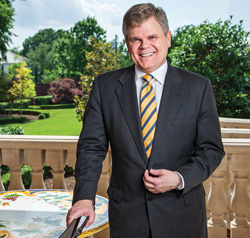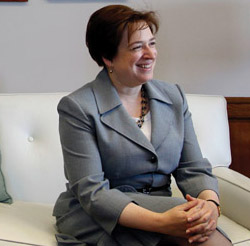Kagan’s Teachers: 9th Justice Talks About Her Influences in Writing, Reading and Reasoning

Photo of Bryan A. Garner by Terri Glanger.
Last year, I had the opportunity to interview Justice Elena Kagan, the ninth justice I have interviewed at length about writing. The session took place at 4 p.m. on Oct. 28, 2011, a few hours before she and her colleagues were to hold a banquet honoring Justice Antonin Scalia for his 25 years of service on the court. Justice Kagan beamed as she strode buoyantly into the Lawyers’ Lounge at the court.
G: What is your very first memory of writing?
K: My first memory of writing is actually having my writing torn apart by my mother.
G: Really?
K: I don’t know how old I was, in elementary school or junior high school. But my mother became a teacher. I guess I was in seventh grade when she went back to the classroom. But before that all her teacher qualities were focused on her kids. And she was a fine writer. She thought it was important that her children be as good writers as they could be. She spent a lot of time going over each sentence in any report that we wrote. That’s my first memory of writing: going over each sentence of anything I ever wrote in my early years of school with my mother.
G: So do you think she taught you as much about writing as anyone?

Click here to Read the unedited transcript
Photo by Associated Press.
K: I suspect she did. I guess there are two people who taught me a tremendous amount about writing. One is my mother in my childhood years. The second was a college professor of mine. He was my thesis adviser—a man named Sean Wilentz, who is a very fine historian and teaches American history at Princeton. … He spent so much time not just trying to teach me how to be a good historian but really trying to teach me to be a good writer. He would mark up my thesis during my senior year at Princeton. … That experience was probably the first time in my life when somebody who himself was a fabulous writer spent so much time, sentence by sentence, telling me what I could do better.
G: Some people consider the kind of severity that you’re describing with your mother to turn them off to writing altogether. How did you overcome that?
K: … She had very high standards, so if having high standards is some form of severity, then yes, I guess she was severe. But I learned a lot from her and can count many years’ worth of students who learned a lot from her. And when I think back about it, I’m glad she did that. I don’t know how good a writer I am, but I’m sure I’m much better now than I would’ve been had she not thought of this as something that was important. G: What about your progress as a public speaker? You had a lot of practice over the years in public speaking. How did you progress there?
K: I had the most practice when I became dean at Harvard Law School. I don’t think I had done a whole lot of public speaking until that time. But as dean of a major law school, I would say every day I found myself in some occasion where I just had to stand up and speak
—sometimes more informally than other times. …
G: Had you done very many oral arguments before you became solicitor general?
K: I had not. I had not done any appellate arguments.
G: Really?
K: No, I had done district court arguments in my early days … at Williams & Connolly. But that had been 15 or 20 years earlier. So I was thrown into the deep end of the pool, shall we say.
G: Was your very first oral argument in the U.S. Supreme Court?
K: My very first appellate argument was in the U.S. Supreme Court.
G: Wow! That’s incredible!
K: It was even worse than that, really: It was in the U.S. Supreme Court and it was the Citizens United case.
G: That was your first oral argument?
K: It was my first oral argument. It was an important argument. For those who don’t know, it was a case that had been argued the prior term. The court had decided to reargue it and had set a couple of questions for reargument on whether the court should reverse its precedents in a couple of important cases. It was pretty clear to people that the court was ready to do something significant—to reverse those cases. So it was nerve-wracking to do an argument of that importance for my first one. But every time I got too nervous about it, I would say it’s OK because we know which way this is going to come out. You’re going to lose. …
G: I’ll bet! Who was the most active questioner?
K: Gosh, I got it from all over. As you know, when you come to the court these days, you do get it from all over. But I would say Justice Scalia was a very active questioner. If I recall it right, I opened my mouth and maybe I got a sentence and a half out. And then Justice Scalia said something like “No, no, no!”—which if you know Justice Scalia, probably doesn’t strike you as completely out of character for him. But I loved being questioned by Justice Scalia because you always knew where he was coming from, and he always told you what he thought was the matter with your position. But he also gave you an opportunity to answer him, so he never tried to monopolize the floor. Certainly the chief justice was a very active questioner, and I remember some questions from Justice Kennedy and from Justice Stevens. Those are the ones I recall the best.
G: How many arguments did you end up having as solicitor general?
K: I did six over the course of the year, starting with Citizens United, and then basically one a month—except I didn’t do it my last month because I was getting ready to be nominated. …
G: What do you like to read in your spare time?
K: I do a fair amount of reading, and I read all kinds of things. I read a lot of history.
G: What kind of history?
K: Mostly American history. Sometimes I read other kinds of history: European history and history from other parts of the world. And I also read a lot of novels: some detective fiction, crime fiction, a little bit of science. I try to be broad, and if I pick up a good book review or a friend of mine says I have to read this book, I try not to say, “Oh, I’m sorry, I don’t read in that area.” So I read a mix of fiction and nonfiction.
G: Who are your favorite historians?
K: Well, I’ll say Sean Wilentz, who is my personal favorite historian. He wrote this wonderful book recently about the rise of democracy in America (The Rise of American Democracy: Jefferson to Lincoln). It’s principally about the Jacksonian period, but it stretches a little bit backward and a little bit forward as well. But some of my other favorites: Richard Hofstadter was great. He wrote some years ago—some decades ago at this point—but was an extraordinary historian. And in American history, Edmund Morgan in the colonial period; and then the great historian of the revolutionary and early republic period is in my mind Gordon Wood. I just love his work.
G: Do you find it somewhat wrenching to go from, on the one hand, reading all this first-rate nonfiction and fiction to the briefs you’re having to read?
K: Well, they’re sometimes not as good. But I like reading briefs too. It’s just a different kind of reading. And if you don’t like reading briefs, then you shouldn’t be in this job. The briefs are your avenue into really important, really challenging legal issues, and that’s what makes reading briefs fun. And occasionally, very occasionally, you’ll read a brief that is just a masterwork of brief-writing, and you’ll just enjoy it for that reason alone. …
G: How often do you read one that you think is a masterwork?
K: Well, a masterwork is a very high standard.
G: Well, it is. Once a term, twice a term?
K: I would say more often than that. Once a sitting I’ll say, “Boy, this person did just a fabulous job on this brief. You kind of can’t imagine it getting any better.”
G: Do you think you have a very good sense of the quality of the briefing nationwide in the circuit courts, as opposed to briefing in the Supreme Court?
K: I don’t think I do. We live in a rarefied environment here, both with respect to brief-writing and with respect to oral advocacy. And that’s because over the last 20 years a Supreme Court bar has developed. … I think the lawyering is really a lot better than the lawyering that a lot of appellate courts and district courts around the country see. It’s easy to forget that. …
G: If there were one thing about brief-writing you could reform, what would it be?
K: Well, I think everybody would say the same thing: That the most important thing in a brief is clarity.
This is an edited version of Garner’s interview. Read the unedited transcript.
Bryan A. Garner is president of LawProse Inc. and editor-in-chief of Black’s Law Dictionary. He is also the author of Garner’s Dictionary of Legal Usage, Garner’s Modern American Usage and Making Your Case: The Art of Persuading Judges (with Justice Antonin Scalia).



